人教版八年级英语上册1-5单元知识点(词汇+句型+固定搭配)
- 格式:doc
- 大小:52.00 KB
- 文档页数:12

人教版八年级英语上册各单元知识要点Unit 1When is your birthday?1. 询问生日的方式:- When is your birthday?- My birthday is on (具体日期) + (月份) (ordinal numeral)th.- It's on the (具体日期) + (月份) (ordinal numeral)th.2. 表达年龄的方式:- How old are you?- I am (年龄) years old.Unit 2How often do you exercise?1. 表达频率的副词:- always 总是- often 经常- usually 通常- sometimes 有时候- rarely 很少- never 从不2. 频率副词在句子中的位置:- 常用于be动词、助动词或情态动词之后,行为动词之前。
Unit 3Why do you like koalas?1. 表达喜欢或不喜欢的方式:- Why do you like/don't like + 名词?- Because they are (形容词).- Because they are (形容词) + and (形容词).Unit 4What's the best movie theater?1. 表达最高级的方式:- What's + the + 形容词最高级 + 名词 (单数) ?- What's + the + most/least + 形容词 + 名词 (复数) ?Unit 5Do you want to watch a game show?1. 表达想要做某事的方式:- Do you want to + 动词原形 + 名词?- Sure./Yes, I do./No, I don't.2. 表达对某事感兴趣的方式:- Are you interested in + 名词/动名词?- Yes, I am./No, I'm not.Unit 6I'm going to study computer science.1. 表达将来计划、打算要做某事的方式:- I'm going to + 动词原形.- I'm + (具体时间) + going to + 动词原形.2. 表达将来计划、打算要做某事的原因:- Why are you going to + 动词原形?- Because + 原因.Unit 7Will people have robots?1. 表达将来会发生的事情:- Will + 主语 + 动词原形?- Yes, 主语 + will./No, 主语 + won't.2. 表达对将来的预测和想法:- I think + 将来的情况 + (will) + 结果.- Maybe + 将来的情况 + will + 结果.Unit 8How do you make a banana milk shake?1. 描述烹饪步骤的连词:首先,第一,接下来,然后,最后2. 描述烹饪步骤的动词:- peel 削皮- chop 切碎- blend 搅拌- pour 倒- mix 混合- serve 上菜Unit 9How was your weekend?1. 询问周末活动的方式:- How was your weekend?- What did you do on the weekend?2. 描述周末活动的过去式:- I (动词过去式) + (具体活动).Unit 10Where did you go on vacation? 1. 询问度假地点的方式:- Where did you go on vacation?- I went to (具体度假地点).2. 描述度假活动的过去式:- I (动词过去式) + (具体活动) on vacation.以上是人教版八年级英语上册各单元的知识要点,通过灵活运用这些表达方式和句型结构,可以更加流利地进行英语交流。
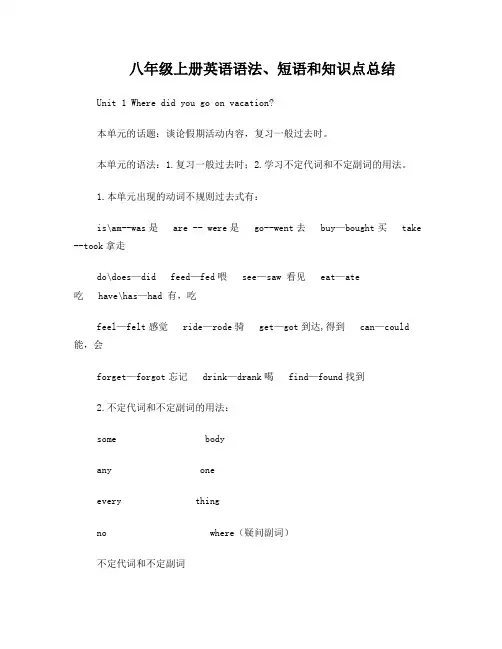
八年级上册英语语法、短语和知识点总结Unit 1 Where did you go on vacation?本单元的话题:谈论假期活动内容,复习一般过去时。
本单元的语法:1.复习一般过去时;2.学习不定代词和不定副词的用法。
1.本单元出现的动词不规则过去式有:is\am--was是 are -- were是 go--went去 buy—bought买 take --took拿走do\does—did feed—fed喂 see—saw 看见 eat—ate吃 have\has—had 有,吃feel—felt感觉 ride—rode骑 get—got到达,得到 can—could 能,会forget—forgot忘记 drink—drank喝 find—found找到2.不定代词和不定副词的用法:some bodyany oneevery thingno where(疑问副词)不定代词和不定副词(1)左边的some、any、every、no与右边的body、one、thing构成不定代词,some、any、every、no与右边的疑问副词where构成不定副词;(2)一般情况下以some开头的不定代词和不定副词用于肯定句,以any开头的不定代词和不定副词用于否定句、疑问句;以no开头的不定代词和不定副词表示否定含义(no one为两个单词);(3)不定代词或不定副词和形容词连用时,形容词放在后面。
He has something important to do.他有重要的事情要做。
(肯定句用something,形容词important放后)Did you buy anything special? (一般疑问句用anything,形容词special放后)Did you go anywhere interesting last month?上个月你去令人感兴趣的地方了吗?(一般疑问句用不定副词anywhere,形容词interesting放后)(4)不定代词和不定副词做主语时,后面的动词用单数形式。
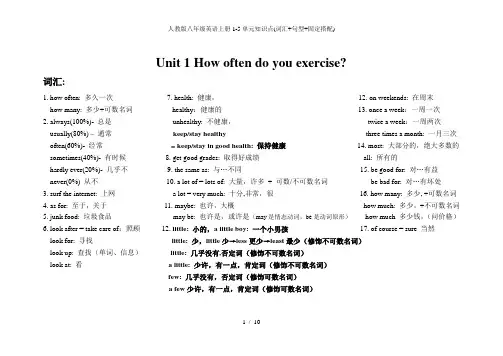
Unit 1 How often do you exercise?词汇:1. how often: 多久一次7. health: 健康,12. on weekends: 在周末how many: 多少+可数名词healthy:健康的13. once a week:一周一次2. always(100%)- 总是unhealthy: 不健康,twice a week:一周两次usually(80%) –通常keep/stay healthy three times a month: 一月三次often(60%)- 经常= keep/stay in good health: 保持健康14. most: 大部分的,绝大多数的sometimes(40%)- 有时候8. get good grades: 取得好成绩all: 所有的hardly ever(20%)- 几乎不9. the same as: 与…不同15. be good for: 对…有益never(0%) 从不10. a lot of = lots of: 大量,许多+ 可数/不可数名词be bad for: 对…有坏处3. surf the internet: 上网 a lot = very much: 十分,非常,很16. how many: 多少, +可数名词4. as for: 至于,关于11. maybe: 也许,大概how much: 多少,+不可数名词5. junk food: 垃圾食品may be: 也许是,或许是(may是情态动词,be是动词原形)how much 多少钱,(问价格)6. look after = take care of:照顾12. little: 小的,a little boy: 一个小男孩17. of course = sure 当然look for: 寻找little: 少,little少→less更少→least最少(修饰不可数名词)look up: 查找(单词、信息)little: 几乎没有,否定词(修饰不可数名词)look at: 看 a little: 少许,有一点,肯定词(修饰不可数名词)few: 几乎没有,否定词(修饰可数名词)a few少许,有一点,肯定词(修饰可数名词)1 / 10句型:1.How often do you exercise? →I exercise three times a week. How often does she shop? →She shops once a month.2.What do you usually do on weekends? →I usually watch TV. How often does she watch TV? →She watches TV everyday.3.How many hours do you sleep every night? 你每晚睡几个小时?→I sleep nine hours every night.How many books do you have? 你有多少本书?→I have 5 books.How much is the sweater? 这件毛衣多少钱?How much water do you have? 你有多少水?(how much: 多少,后面+不可数名词, water是不可数名词)4.What’s your favorite program? 你最喜欢的电视节目是什么?→It’s Animal World.固定搭配:try to do sth.: 尽力做某事,设法做某事try doing sth.: 试着做、尝试做某事help sb. (to) do sth: 帮助某人做某事(to可以省略)want sb. to do sth.: 想要某人做某事2 / 10Unit 2 What’s the matter?词汇:1. have a cold 感冒9. few: 几乎没有,否定词(修饰可数名词)have a fever 发烧 a few少许,有一点,肯定词(修饰不可数名词)have a stomachache 肚子痛little: 几乎没有,否定词(修饰不可数名词)have a headache 头疼 a little: 少许,有一点,肯定词(修饰不可数名词)have a toothache 牙齿疼10. at the moment = now 现在,此刻have a sore throat 喉咙疼11. host family 寄宿家庭have a sore back 背部酸疼12. not…until…直到……时候才……2. lie down and have a good rest 躺下好好休息13. should 应该,情态动词,后+动词原形3. hot tea with honey 加了蜂蜜的热茶should not=shouldn’t4. ill 病了的illness 疾病14. see a doctor 看医生5. advice 建议(不可数名词)see a dentist 看牙医some advice(不能加”s”) 15. too many太多…,修饰可数名词too many students6. be stressed out 有压力的,紧张的too much太多…,修饰不可数名词too much yin7. balance 平衡balanced 平衡的much too 太……,much too big 太大a balanced diet 平衡的饮食16. stay=keep 保持on a diet 节食keep/stay healthy8. get 变得= keep/stay in good health: 保持健康get angry 变得生气get tired 变得劳累3 / 10句型:1. What’s the matter with you? = What’s the trouble with you? = What’s wrong with you? 你怎么了?→I have a cold/ have a toothache/ have a sore throat….2. Wha t’s the matter? →She has a cold.3. Does he have a cold? →Yes, he does.4. A: What’s the matter?B: I’m not feeling well.(此处不能用good) I have a cold.A: When did it start?B: About two days ago.A: That’s too bad. You should drink lots of water.B: Yes, I think so.A: I hope you feel / get better soon. 我希望你尽快好起来5. A: I have a coldB: I am sorry to hear that. (当听到对方不好的消息时使用此句)固定搭配:It is + 形容词+ (for sb.) to do sth. 做某事对某人来说是………的例句:It is easy for me to learn (learn) English. 对我来说学英语是容易的It is interesting to watch (watch) Animal World. 看动物世界时有趣的4 / 10Unit 3 What are you doing for vacation?→→→本单元用现在进行时态表示将来的事情现在进行时态,即be + doing:词汇:1. go camping 去野营 6. a lot = very much 十分、非常、很2. A: What are you doing for vacation? go fishing 去钓鱼 a lot of = lots of 许多、大量B: I am going camping.go shopping 去购物7. away 向远处、离开A: That sounds nice.go swimming 去游泳go away 离开Who are you going with?go hiking 去远足B: I am going with my parents.go bike riding 去骑单车8. stay: 留、停留、呆go sightseeing 去观光旅游 3. Linda is going to Tibet next summer. (划线提问)2. how long 多久、多长时间句型:→Where is Linda going next summer?3. get back 回来get back to school 1. What are you doing for vacation?4. He’s going on the 12th. (划线提问)4. be famous for…以……而闻名→I am visiting my grandparents. →When is he going?5. leave for…离开去……地方What is your brother doing for vacation?leave →(过去式) left →He is going camping. 5. I’m staying there for a week. (划线提问)left: 左边、离开→How long are you staying?5 / 106.当听到对方提出的建议,如:What about playing basketball? How about taking a walk with me? Why not go to the movie? 为什么不去看电影?I am going camping.等句子时,回答可用以下句型:That sounds nice/ good/ interesting/. That’s a good idea. / Good idea. That sounds like a good idea./ Great等.7.当听到对方要去旅行或是准备出行时,如:I am going to Hongkong for a week. I am going hiking in the mountains.时,回答一般用以下句型:Have a good time!8.询问天气:How is the weather? 或是What’s the weather like?9.询问某人的职业:What do you do? What are you? What’s your job? 你的工作是什么?What does your mother do? What is he? 他是干什么的?10.询问某人的性格:What are you like? →I am outgoing/ shy/ quiet.What is he like? 他是个什么样的人?→He is outgoing/ shy/ quiet. 他很外向/害羞/安静10. 询问某人长的什么样子:What does he look like? 他长的什么样子?→He is of medium build/height. 他中等身材/身高.What does your father look like? →He is tall. 他很高11. 询问某人喜欢什么:What do you like? 你喜欢什么?→I like basketball. 我喜欢篮球固定搭配:1.finish doing sth 完成做某件事例:I finished doing my homework. 我完成了我的家庭作业6 / 10Unit 1-3 单元课本语法知识& 在讲解畅优新课堂时补充的语法知识点与固定搭配:1.情态动词后+动词原形(do)已学情态动词:can 能够, must 必须, should 应该, may 也许. would 想,会help sb (to) do sth 帮助某人做某事2. 介词后若接动词,则接动词的ing形式:常见的:what about + doing sth? 做………怎么样?常接doing的固定搭配:1. like doing sth 喜欢做某事2. enjoy doing sth 享受做某事3. have a good/ have fun in doing sth 做某事玩的很开心4. finish doing sth 完成做某件事5. spend +(时间、金钱、精力) doing sth 花时间、金钱、精力做某事= spend +(时间、金钱、精力) on sth3. 不定式,即:to do常接不定式的固定搭配:want sb to do sth 想要某人做某事would like to do sth 想做某事tell sb to do sth 告诉某人做某事ask sb to do sth 要求某人做某事plan to do sth 计划做某事decide to do sth 决定做某事need to do sth 需要做某事forget to do sth 忘记做某事try to do sth 尽力做某事4. 不定代词+ 形容词结构例:something interesting 一些有趣的事情7 / 10Unit 4 How do you get to school?词汇:1. get to: 到达arrive at: 到达+ 小地点(学校、医院…)arrive in: 到达+ 大地点(城市、国家、地区…)reach: 到达2. take the bus = by bus:坐公交车8. how long: 多久,how far:多远13. take…to…把…带到…3. take the train = by train:坐火车9. from…to…从…到…14. from: 离…的距离4. take the subway = by subway:坐地铁10. think of: 认为think about: 考虑15. not all: 不是所有5. ride one’s bike = by bike:骑单车11. around the world = all over the world: 全世界6. walk = on foot:走路12. be different from: 与…不同16. more…than…:比…更…,than: 比7. depend on: 视……而定,决定于……,依靠……17.other 其他的,形容词18. than 比others 其他的人或其他的事19. more…than…比……更……,形容词比较级的用法the other 两者中的另一个,单数概念the others 两部分中的另一部分,复数概念another 另外一个,另外的,第三个的8 / 10句型:1. How do you get to school? →I take the bus. / I go to school by bus.How does she get to school? →She takes the bus. / She goes to school by bus.2. How long does it take?→It takes about/around 10 minutes. →It takes about 25 minutes to walk and 10 minutes by bus. How long does it take you to get from home to school? →It takes 25 minutes.3. How far is it from your home to school? →It’s 3 miles./10 kilometers.4. What do you think of………? = how do you like……? 你认为……怎么样?5. How far do you live from school?你住的离学校有多远→I live 10 miles from school.6. Can I help you? May I help you? →Yes, please.固定搭配:1.It takes sb. + 时间+ to do sth. 例句:It takes me 20 minutes to walk (walk)2.need to do sth. 需要做某事3.more…than…比……更……,形容词比较级的用法4 形容词的比较级&最高级:规则变化:比较级:形容词尾+“er”,最高级:+“est ”,例:big →bigger →the biggest不规则变化:三个音节及以上的形容词(比较长的形容词),比较级:前面+ more, 最高级:前面+most,例:popular 流行的→more popular更流行的→the most popular 最流行的最高级前面+“the”例:This classroom is bigger than that one. 这件教室比那间大This classroom is the biggest. 这间教室是最大的9 / 10Unit 5 Can you come to my party?词汇:1. other 其他的The other 另一个(两个中的另一个) 9. have to 不得不,要…The others 另一部分(两部分中的另一部分)10. babysit= look after = take care of = care for 关心,照顾Another 另外的,另一个(三个以上中的另一个)2. the day before yesterday 前天句型:yesterday 昨天 1. Can you come to my party?today 今天Yes, I’d love to.(肯定回答)tomorrow 明天I’m sorry, I can’t. I have to……(否定回答)the day after tomorrow 后天 2. What’s today? 今天星期几,几号?(星期、日期都可以问) 3. on weekends 在周末It’s Monday the 14th. 今天14号星期一。
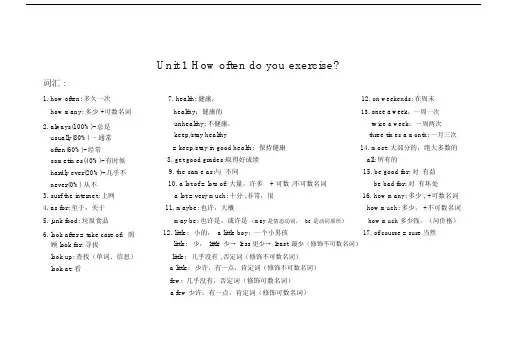
词汇 :1.how often: 多久一次how many: 多少 +可数名词2.always(100%)- 总是usually(80%) –通常often(60%)- 经常sometimes(40%)- 有时候hardly ever(20%)- 几乎不never(0%) 从不3.surf the internet: 上网4.as for: 至于,关于5.junk food: 垃圾食品6.look after = take care of:照顾 look for: 寻找look up: 查找(单词、信息)look at: 看Unit 1 How often do you exercise?7. health: 健康,12. on weekends: 在周末healthy:健康的13. once a week:一周一次unhealthy: 不健康,twice a week:一周两次keep/stay healthy three times a month: 一月三次= keep/stay in good health:保持健康14. most: 大部分的,绝大多数的8. get good grades:取得好成绩all: 所有的9. the same as:与不同15. be good for: 对有益10. a lot of = lots of: 大量,许多+ 可数 /不可数名词be bad for: 对有坏处a lot = very much: 十分 ,非常,很16. how many: 多少 , +可数名词11. maybe: 也许,大概how much: 多少, +不可数名词may be: 也许是,或许是(may是情态动词,be是动词原形)how much 多少钱,(问价格)12. little:小的,a little boy:一个小男孩17. of course = sure 当然little:少,little少→ less更少→ least最少(修饰不可数名词)little:几乎没有,否定词(修饰不可数名词)a little:少许,有一点,肯定词(修饰不可数名词)few: 几乎没有,否定词(修饰可数名词)a few 少许,有一点,肯定词(修饰可数名词)句型:1. How often do you exercise? → I exercise three times a week. How often does she shop? → She shops once a month.2. What do you usually do on weekends?→ I usually watch TV. How often does she watch TV? → She watches TV everyday.3. How many hours do you sleep every night? 你每晚睡几个小时?→ I sleep nine hours every night.How many books do you have? 你有多少本书?→ I have 5 books.How much is the sweater? 这件毛衣多少钱?How much water do you have? 你有多少水? (how much: 多少,后面 +不可数名词 , water 是不可数名词 )4. What’syour favorite program? 你最喜欢的电视节目是什么?→ It ’s Animal World.固定搭配:try to do sth.: 尽力做某事,设法做某事try doing sth.: 试着做、尝试做某事help sb. (to) do sth: 帮助某人做某事 (to 可以省略 )want sb. to do sth.: 想要某人做某事Unit 2 What ’s the matter? 词汇 :1.have a cold 感冒have a fever 发烧have a stomachache肚子痛 have a headache头疼have a toothache牙齿疼have a sore throat 喉咙疼have a sore back背部酸疼2.lie down and have a good rest躺下好好休息3.hot tea with honey 加了蜂蜜的热茶4.ill 病了的 illness 疾病5.advice 建议(不可数名词)some advice(不能加”s”)6.be stressed out有压力的,紧的7.balance 平衡 balanced 平衡的 a balanced diet 平衡的饮食on a diet 节食8.get 变得get angry 变得生气get tired 变得劳累9.few: 几乎没有,否定词(修饰可数名词)a few 少许,有一点,肯定词(修饰不可数名词)little:几乎没有,否定词(修饰不可数名词)a little:少许,有一点,肯定词(修饰不可数名词)10.at the moment = now 现在,此刻11.host family 寄宿家庭12.not until直到时候才13.should 应该,情态动词,后 +动词原形should not=shouldn’t14. see a doctor 看医生see a dentist 看牙医15. too many 太多,修饰可数名词too many students too much 太多,修饰不可数名词too much yin much too 太, much too big 太大16. stay=keep 保持keep/stay healthy= keep/stay in good health: 保持健康句型:1.What’s the matter with you? = What’s the trouble with you? = What’s wrong with you? 你怎么了?→ I have a cold/ have a toothache/ have a sore throat.2.What ’sthe matter? → She has a cold.3.Does hehave a cold? → Yes, he does.4.A: What’s the matter?B: I ’m not feeling well .(此处不能用 good) I have a cold.A: When did it start?B: About two days ago.A: That’stoo bad. You should drink lots of water.B: Yes, I think so.A: I hope you feel / get better soon. 我希望你尽快好起来5.A: I have a coldB: I am sorry to hear that. (当听到对方不好的消息时使用此句)固定搭配:It is + 形容词+ (for sb.) to do sth. 做某事对某人来说是的例句:It is easy for me to learn (learn) English. 对我来说学英语是容易的It is interesting to watch (watch) Animal World. 看动物世界时有趣的Unit 3 What are you doing for vacation?→→→ 本单元用现在进行时态表示将来的事情现在进行时态,即be + doing:词汇 :1. go camping 去野营go fishing去钓鱼go shopping 去购物go swimming 去游泳go hiking 去远足go bike riding 去骑单车go sightseeing 去观光旅游6. a lot = very much 十分、非常、很a lot of = lots of 许多、大量7. away 向远处、离开go away 离开8. stay: 留、停留、呆2. A: What are you doing for vacation?B: I am going camping.A: That sounds nice.Who are you going with?B: I am going with my parents .3. Linda is going to Tibet next summer.(划线提问)2. how long 多久、多长时间句型:→Where is Linda going next summer?3. get back 回来 get back to school4. be famous for以而闻名5. leave for离开去地方leave →(过去式 ) leftleft: 左边、离开1. What are you doing for vacation?→ I am visiting my grandparents.What is your brother doing for vacation?→ He is going camping.4. He’s going on the 12th . (划线提问)→ When is he going?5. I’m staying there for a week. (划线提问→How long are you staying?)6.当听到对方提出的建议,如:What about playing basketball? How about taking a walk with me? Why not go to the movie? 为什么不去看电影?I am going camping.等句子时,回答可用以下句型:That sounds nice/ good/ interesting/. That ’s a good idea. / Good idea. That sounds like a good idea./ Great 等 .7.当听到对方要去旅行或是准备出行时,如: I am going to Hongkong for a week. I am going hiking in the mountains.时,回答一般用以下句型: Have a good time!8. 询问天气: How is the weather? 或是 What’s the weather like?9. 询问某人的职业: What do you do? What are you? What’s your job? 你的工作是什么?What does your mother do? What is he? 他是干什么的?10. 询问某人的性格: What are you like? → I am outgoing/ shy/ quiet.What is he like? 他是个什么样的人?→ He is outgoing/ shy/ quiet. 他很外向/害羞/安静10. 询问某人长的什么样子: What does he look like ? 他长的什么样子?→ He is of medium build/height . 他中等身材 /身高 .What does your father look like ? → He is tall. 他很高11. 询问某人喜欢什么:What do you like? 你喜欢什么?→ I like basketball. 我喜欢篮球固定搭配:1. finish doing sth 完成做某件事例: I finished doing my homework. 我完成了我的家庭作业Unit 1-3 单元课本语法知识& 在讲解畅优新课堂时补充的语法知识点与固定搭配:1.情态动词后 +动词原形 (do)已学情态动词: can 能够 , must 必须 , should 应该 , may 也许 . would 想,会help sb (to) do sth 帮助某人做某事2.介词后若接动词,则接动词的 ing 形式:常见的: what about + doing sth? 做怎么样?常接 doing 的固定搭配:1. like doing sth 喜欢做某事2. enjoy doing sth 享受做某事3. have a good/ have fun in doing sth做某事玩的很开心4.finish doing sth 完成做某件事5. spend +(时间、金钱、精力 ) doing sth 花时间、金钱、精力做某事=spend +(时间、金钱、精力 ) on sth3.不定式,即: to do常接不定式的固定搭配:want sb to do sth 想要某人做某事 ask sb to do sth 要求某人做某事 need to do sth 需要做某事would like to do sth 想做某事plan to do sth 计划做某事forget to do sth忘记做某事tell sb to do sth 告诉某人做某事decide to do sth 决定做某事try to do sth 尽力做某事4.不定代词 + 形容词结构例: something interesting 一些有趣的事情Unit 4 How do you get to school? 词汇 :1. get to: 到达arrive at: 到达 + 小地点(学校、医院⋯)arrive in: 到达 + 点(城市、国家、地区⋯)reach: 到达2. take the bus = by bus:坐公交3. take the train = by train:坐火4. take the subway= by subway:坐地5. ride one’s bike = by bike:6. walk = on foot:走路8. how long: 多久,how far:多9. from⋯to⋯从⋯到⋯10. think of:think about: 考11. around the world = all over the world:12. be different from: 与⋯不同13. take⋯ to⋯把⋯到⋯14. from: 离⋯的距离15. not all: 不是所有全世界16. more⋯ than⋯:比⋯更⋯,than: 比7.depend on: ⋯⋯而定,决定于⋯⋯,依靠⋯⋯17.other 其他的,形容others 其他的人或其他的事the other 两者中的另一个,数概念the others 两部分中的另一部分,复数概念another 另外一个,另外的,第三个的18. than 比19. more⋯than⋯比⋯⋯更⋯⋯,形容比的用法句型:1.How do you get to school? → I take the bus . / I go to school by bus.How does she get to school?→ She takes the bus. / Shegoes to school by bus.2.How long does it take? → It takes about/around 10 minutes. → It takes about 25 minutesto walk and 10 minutesby bus. How long does it take you to get from home to school? → It takes 25 minutes.3. How far is it from your home to school?→ It’s3 miles./10 kilometers.4. What do you think of? = how do you like? 你认为怎么样?5. How far do you live from school?你住的离学校有多远→ I live 10 miles from school.6. Can I help you? May I help you? → Yes, please.固定搭配:1.It takes sb. + 时间 + to do sth. 例句: It takes me 20 minutesto walk (walk)2.need to do sth. 需要做某事3.more than 比更,形容词比较级的用法4形容词的比较级 & 最高级:规则变化:比较级:形容词尾 +“ er”,最高级: +“est ”,例: big → bigger → the biggest不规则变化:三个音节及以上的形容词(比较长的形容词),比较级:前面+ more,最高级:前面+most,例: popular 流行的→more popular更流行的→the most popular 最流行的最高级前面 +“the”例: This classroom is bigger than that one. 这件教室比那间大This classroom is the biggest. 这间教室是最大的Unit 5 Can you come to my party? 词汇:1.other 其他的The other 另一个 (两个中的另一个 )The others 另一部分(两部分中的另一部分)Another 另外的,另一个(三个以上中的另一个)2.the day before yesterday前天 yesterday 昨天today 今天tomorrow 明天the day after tomorrow 后天3.on weekends 在周末on weekdays 在工作日e over 顺便来访visit 拜访,看望,参观5.study for test 准备考试6.go to the doctor 看医生7.have a piano lesson上钢琴课8.too much homework 太多家庭作业much too 太 too many 太多 + 可数名词9. have to 不得不,要10. babysit= look after = take care of = care for 关心,照顾句型:1.Can you come to my party?Yes, I’d love to.(肯定回答 )I’m sorry, I can’t. I have to(否定回答 )2.What’s today? 今天星期几,几号? (星期、日期都可以问 )thIt’s Monday the 14 . 今天 14 号星期一。
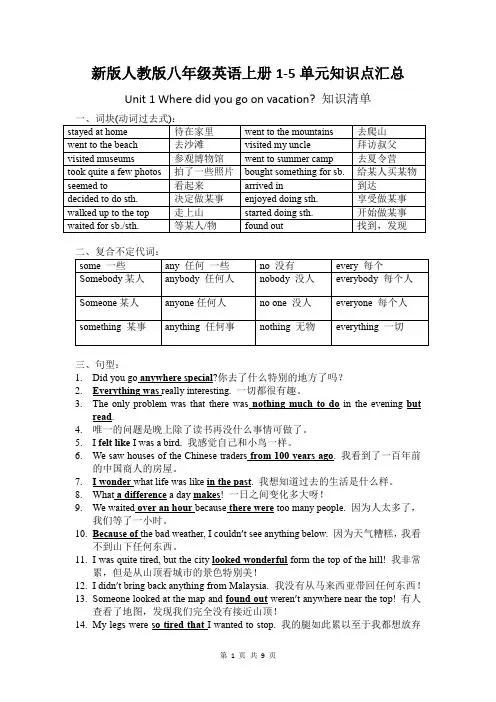
新版人教版八年级英语上册1-5单元知识点汇总Unit 1 Where did you go on vacation? 知识清单三、句型:1.Did you go anywhere special?你去了什么特别的地方了吗?2.Everything was really interesting. 一切都很有趣。
3.The only problem was that there was nothing much to do in the evening butread.4.唯一的问题是晚上除了读书再没什么事情可做了。
5.I felt like I was a bird. 我感觉自己和小鸟一样。
6.We saw houses of the Chinese traders from 100 years ago. 我看到了一百年前的中国商人的房屋。
7.I wonder what life was like in the past. 我想知道过去的生活是什么样。
8.What a difference a day makes! 一日之间变化多大呀!9.We waited over an hour because there were too many people. 因为人太多了,我们等了一小时。
10.Because of the bad weather, I couldn’t see anything below. 因为天气糟糕,我看不到山下任何东西。
11.I was quite tired, but the city looked wonderful form the top of the hill! 我非常累,但是从山顶看城市的景色特别美!12.I didn’t bring back anything from Malaysia. 我没有从马来西亚带回任何东西!13.Someone looked at the map and found out weren’t anywhere near the top! 有人查看了地图,发现我们完全没有接近山顶!14.My legs were so tired that I wanted to stop. 我的腿如此累以至于我都想放弃了。
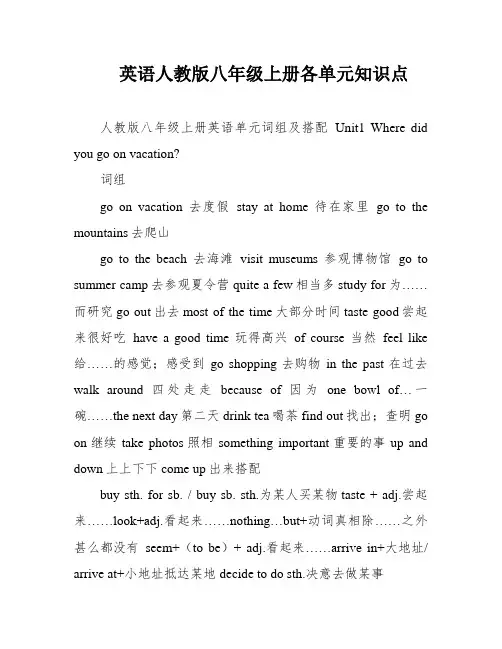
英语人教版八年级上册各单元知识点人教版八年级上册英语单元词组及搭配Unit1 Where did you go on vacation?词组go on vacation去度假stay at home待在家里go to the mountains去爬山go to the beach去海滩visit museums参观博物馆go to summer camp去参观夏令营quite a few相当多study for为……而研究go out出去most of the time大部分时间taste good尝起来很好吃have a good time玩得高兴of course当然feel like 给……的感觉;感受到go shopping去购物in the past在过去walk around四处走走because of因为one bowl of…一碗……the next day第二天drink tea喝茶find out找出;查明go on继续take photos照相something important重要的事up and down上上下下come up出来搭配buy sth. for sb. / buy sb. sth.为某人买某物taste + adj.尝起来……look+adj.看起来……nothing…but+动词真相除……之外甚么都没有seem+(to be)+ adj.看起来……arrive in+大地址/ arrive at+小地址抵达某地decide to do sth.决意去做某事try doing sth.尝试做某事/ try to do sth.尽力去做某事forget doing sth.忘记做过某事/ forget to do sth.忘记做某事enjoy doing sth.喜欢做某事want to do sth.想去做某事start doing sth.开始做某事stop doing sth.停止做某事dislike doing sth.不喜欢做某事keep doing sth.继续做某事Why not do. sth.?为什么不做……呢?so+adj.+that+从句如此……以至于……tell sb. (not) to do sth.告诉某人(不要)做某事语法:不定代词和一般过去时态Unit2 How often do you exercise?词组help with housework帮助做家务on weekends在周末how often多久一次hardly ever几乎从不once a week每周一次twice a month每月两次every day每天be free有空go to the movies去看电影use the Internet用互联网swing dance摇摆舞play tennis打网球stay up late熬夜;睡得很晚at least至少have dance and piano lessons上舞蹈课和钢琴课go tobed early早点睡觉play sports进行体育活动be good for对……有好处go camping去野营not…at all一点儿也不……in one’s free time在某人的业余时间the most popular最受欢迎的such as比如;诸如old habits die hard积习难改go to the dentist去看牙医morn than多于;跨越less than少于搭配want sb. to do sth.想让某人做某事How many+可数名词复数+一般疑问句?……有多少……?主语+find+that从句.……发现……spend time with sb.和某人一起度过时光It’s+ adj.+ to do sth.做某事的……的。
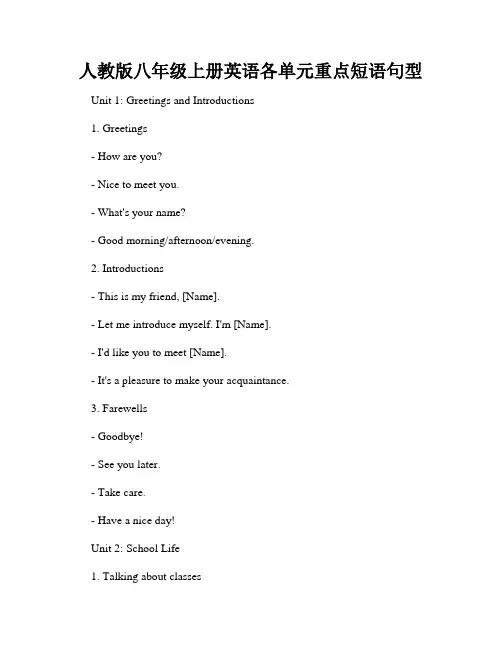
人教版八年级上册英语各单元重点短语句型Unit 1: Greetings and Introductions1. Greetings- How are you?- Nice to meet you.- What's your name?- Good morning/afternoon/evening.2. Introductions- This is my friend, [Name].- Let me introduce myself. I'm [Name].- I'd like you to meet [Name].- It's a pleasure to make your acquaintance.3. Farewells- Goodbye!- See you later.- Take care.- Have a nice day!Unit 2: School Life1. Talking about classes- What's your favorite subject?- I enjoy studying [subject].- My least favorite subject is [subject].- I'm good at [subject].2. Describing teachers- Our teacher is very kind.- Mr./Mrs. [Name] is great at explaining things. - I find our teacher strict but fair.- The teacher always makes the class interesting.3. Discussing school activities- I'm in the school choir/football team.- We have an upcoming school trip.- The school is organizing a charity event.- The annual school concert is next week.Unit 3: Hobbies and Interests1. Talking about hobbies- My hobbies include reading and painting.- I love playing basketball with friends.- In my free time, I enjoy playing video games.- Swimming is one of my favorite activities.2. Sharing preferences- I prefer watching movies over reading books.- I'm more interested in outdoor activities than indoor ones. - I'd rather listen to music than watch TV.- I enjoy both playing and watching sports.3. Making plans- Shall we go to the cinema on Saturday?- How about meeting at the park tomorrow?- Let's have a picnic next weekend.- We could go shopping after school.Unit 4: Family and Friends1. Describing family members- I have one brother and two sisters.- My mom is a doctor, and my dad is a teacher.- My grandparents live with us.- I'm the youngest/oldest in my family.2. Talking about friends- I have a close friend named [Name].- My best friend and I have known each other since kindergarten. - We enjoy spending time together.- My friend is very supportive and always there for me.3. Discussing family activities- Every Sunday, we have a family dinner.- We often go on family trips during holidays.- Our family likes to watch movies together.- We sometimes play board games as a family.Unit 5: Daily Routine1. Describing daily activities- I wake up at 7 am every morning.- After breakfast, I brush my teeth and get dressed.- I take the bus to school.- In the evenings, I do my homework and relax.2. Talking about time- What time do you go to bed?- I have lunch at noon.- We start school at 8:30 am.- It's time to go to the dentist.3. Discussing habits- I always eat breakfast before leaving for school.- I often exercise in the evening.- She sometimes helps her mom in the kitchen.- They rarely go to bed late on weekdays.Unit 6: Celebrations1. Talking about birthdays- My birthday is on [date].- I usually celebrate my birthday with family and friends.- On my birthday, I receive presents and eat cake.- This year, I will have a small party at home.2. Describing festivals- We celebrate Chinese New Year with dragon dances.- Christmas is a time for giving and sharing.- During Diwali, we light oil lamps and exchange gifts.- The Mid-Autumn Festival is known for mooncakes.3. Discussing traditions- It's a tradition to give red envelopes during Lunar New Year. - We always decorate the Christmas tree together.- On Independence Day, there are fireworks and parades.- During Thanksgiving, we gather with family and give thanks.。
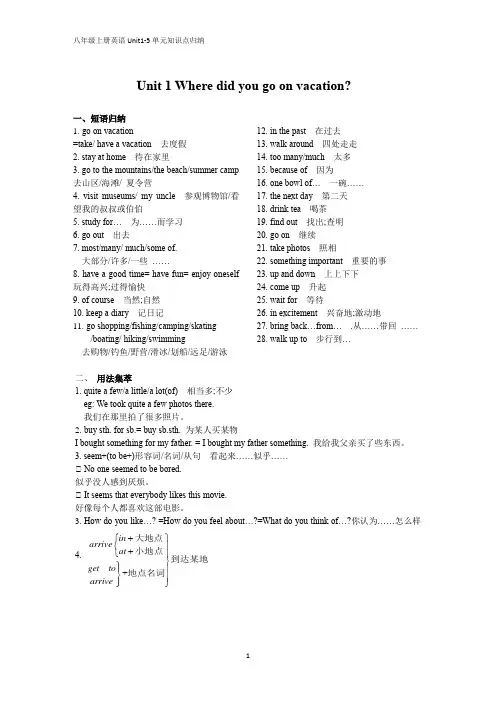
Unit 1 Where did you go on vacation?一、短语归纳1. go on vacation =take/ have a vacation 去度假2. stay at home 待在家里3. go to the mountains/the beach/summer camp 去山区/海滩/ 夏令营4. visit museums/ my uncle 参观博物馆/看望我的叔叔或伯伯5. study for… 为……而学习6. go out 出去7. most/many/ much/some of. 大部分/许多/一些 ……8. have a good time= have fun= enjoy oneself 玩得高兴;过得愉快9. of course 当然;自然 10. keep a diary 记日记 11. go shopping/fishing/camping/skating /boating/ hiking/swimming 去购物/钓鱼/野营/滑冰/划船/远足/游泳12. in the past 在过去13. walk around 四处走走14. too many/much 太多15. because of 因为16. one bowl of… 一碗……17. the next day 第二天18. drink tea 喝茶19. find out 找出;查明20. go on 继续21. take photos 照相22. something important 重要的事23. up and down 上上下下24. come up 升起25. wait for 等待26. in excitement 兴奋地;激动地27. bring back…from… .从……带回 ……28. walk up to 步行到…二、 用法集萃1. quite a few/a little/a lot(of) 相当多;不少eg: We took quite a few photos there.我们在那里拍了很多照片。
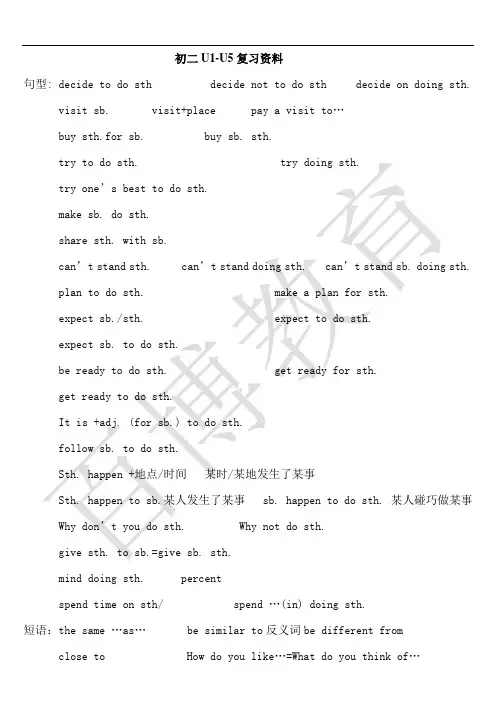
初二U1-U5复习资料句型: decide to do sth decide not to do sth decide on doing sth.visit sb. visit+place pay a visit to…buy sth.for sb. buy sb. sth.try to do sth. try doing sth.try one’s best to do sth.make sb. do sth.share sth. with sb.can’t stand sth. can’t stand doing sth. can’t stand sb. doing sth.plan to do sth. make a plan for sth.expect sb./sth. expect to do sth.expect sb. to do sth.be ready to do sth. get ready for sth.get ready to do sth.It is +adj. (for sb.) to do sth.follow sb. to do sth.Sth. happen +地点/时间某时/某地发生了某事Sth. happen to sb.某人发生了某事 sb. happen to do sth. 某人碰巧做某事Why don’t you do sth. Why not do sth.give sth. to sb.=give sb. sth.mind doing sth. percentspend time on sth/ spend …(in) doing sth.短语:the same …as… be similar to反义词be different fromclose to How do you like…=What do you think of…dress up wait for so…that…到达:get to, arrive at/in, reachas long as more and more+比较级the +比较级,the+比较级study for nothing…but seem+(to be)+ adj.stay up late the best way to do sth.laugh at sb. so farbe up to sb. (to do sth.)come trueHow do you like…?=What do you think of...?be different from be talented inhave fun doing sth. howevertake sb.’s placehave a discussion about sth.learn from区别:because 和 because of so 和 suchhow often, how many, how much, how long, how soonlittle, a little, few, a few, quite a few, quite a little sometimes, some times, sometime, some timehealth和 healthy however 和 but win和 beathope 和 wish be famous for be famous to be famous as dress up dress up as,dress up likedress wear put onstop doing sth. stop to do sth.forget to do sth. forget doing sth.remember to do sth. remember doing sth.④陈述句中含有否定意义的词,如little, few, never, nothing, hardly等。
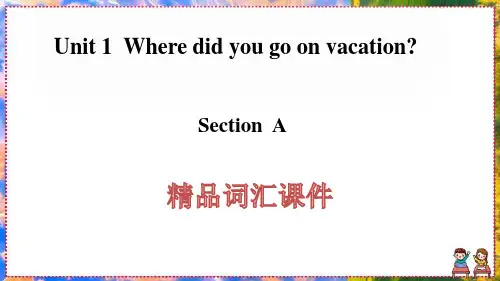
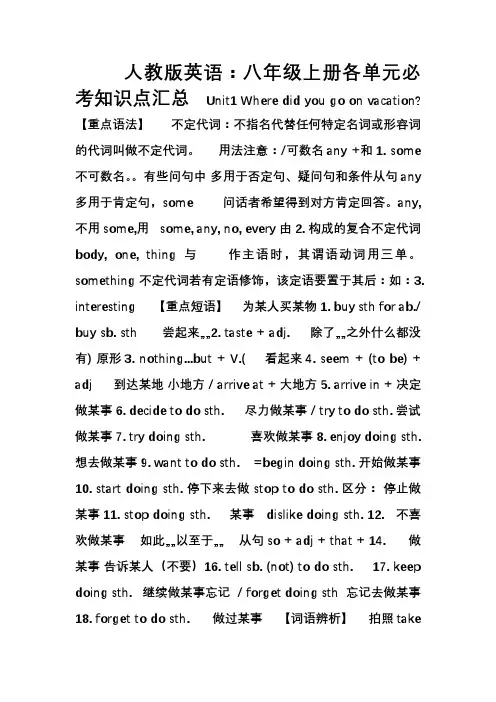
人教版英语:八年级上册各单元必考知识点汇总Unit1 Where did you go on vacation? 【重点语法】不定代词:不指名代替任何特定名词或形容词的代词叫做不定代词。
用法注意:/可数名any +和1. some 不可数名。
有些问句中多用于否定句、疑问句和条件从句any 多用于肯定句,some 问话者希望得到对方肯定回答。
any, 不用some,用some, any, no, every 由2. 构成的复合不定代词body, one, thing与作主语时,其谓语动词用三单。
something 不定代词若有定语修饰,该定语要置于其后:如:3. interesting 【重点短语】为某人买某物1. buy sth for ab./ buy sb. sth 尝起来……2. taste + adj. 除了……之外什么都没有) 原形3. nothing...but + V.( 看起来4. seem + (to be) + adj 到达某地小地方/ arrive at + 大地方5. arrive in + 决定做某事6. decide to do sth. 尽力做某事 / try to do sth. 尝试做某事7. try doing sth. 喜欢做某事8. enjoy doing sth. 想去做某事9. want to do sth. =begin doing sth. 开始做某事10. start doing sth. 停下来去做 stop to do sth. 区分:停止做某事11. stop doing sth. 某事 dislike doing sth. 12. 不喜欢做某事如此……以至于…… 从句so + adj + that + 14. 做某事告诉某人(不要)16. tell sb. (not) to do sth. 17. keep doing sth. 继续做某事忘记 / forget doing sth 忘记去做某事18. forget to do sth. 做过某事【词语辨析】拍照take a photo/ take photos 1.“许多…” 名词复数quite a few+ 看起来…... You seem happy today. 形容词2. seem + I seem to have a cold 好像做某事/似乎seem + to do sth. It seems that no one believe you. 似乎..…. 从句It seems + It seems like a good idea. 好像,似乎….. seem like ... 地点名= get to= reach+大地点3. arrive in + “到达......” 小地点arrive at + arrive here; 介词需省略,如:here/there/home, (注:若后跟地点副词)get home 感觉像…4. feel like sth 想要做某事feel doing sth. 引导的从句。
八年级英语上册知识点Unit 1 Where did you go on vacation?【Section B】1、到达:arrive in + 大地点 arrive at + 小地点get to + 地点 reach + 地点2、决定去做某事:decide to do sth决定不做某事: decide not to do sth(n.) decision 决定 make a decision 做决定3、try doing sth 尝试做某事try to do sth 尽力做某事try one's best to do sth 尽某人最大的努力去做某事try( 三单)tries (过去式) tried4、feel like 1) 感觉像2)想要:想要做某事:want to do sth= would like to do sth=feel like doing sth 5、在一段时间之前:一段时间+ ago = before + 一段时间在一段时间之后:一段时间+later = after + 一段时间6、喜欢做某事:enjoy doing sth7、感叹句:What + a/ an +adj. +可数n.单数+主语+谓语!What + adj. + 可数n. 复数/ 不可数名词 + 主语+ 谓语!How + adj./ adv. +主语+谓语!8、different (adj.) 不同的 difference (n.) 不同之处,差别be different from... 与....不同be the same as ... 与...相同9、开始做某事:start doing sth= start to do sthbegin to do sth= begin doing sth10、等待... wait for...11、rain a little 下小雨 rain hard 下大雨12、too many + 可数名词复数 too much + 不可数名词太多much too +adj. / adv. 太....13、because + 句子 because of + n. / 代词/ v-ing14、bring sth to + 地点:把某物带来某地take sth to + 地点:把某物带到某地15、enough : 足够的(地)enough + 名词 enough moneyadj./ adv +enough: big enough16、forget to do sth 忘记去做某事forget doing sth 忘记做过某事remember to do sth 记得去做某事remember doing sth 记得做过某事17、stop to do sth 停下来去做某事stop doing sth 停止做某事18、another + 数词 + n. = 数词+ more + n. 再多....19、dislike doing sth 不喜欢做某事20、so + adj./ adv. + that +从句如此...以至于....表否定:= too +adj./ adv + to do sth 太...以至于不能...so that ... 以便,为了Unit 2 How often do you exercise?【Section A】1、help with housework 帮忙做家务活help sb with sth . 在某方面帮助某人help sb to do sth 帮助某人做某事2、hard (adj.) 坚硬的,困难的(adv.) 努力地hardly : 几乎从不3、surf the Internet 网上冲浪on the Internet 在互联网上4、full (adj.)1) 忙的(反义) free 空闲的2)满的,充满的(反) empty 空的be full of.... 充满...的 The cup is full of water.3) 饱的(反) hungry 饿的5、maybe : 可能,做adv. , 放句首may be : 可能是(情态动词+v原),做谓语Maybe he is right. = He may be right.6、频度副词:always 总是 usually 通常 often 经常 hardly ever 几乎从不sometimes 有时 never 从不位置:助后实前提问:how often 多久一次【Section B】1、in one's free / spare time 在某人的空闲时间free: 1) 空闲的 2)自由的 3)免费的2、ask : 1) 询问 ask sb about sth 询问某人关于某事2)叫 ask sb to do sth 叫某人去做某事3、result: 结果the result of... ...的结果as a result: 结果是4、基数词+ percent + of + the + n.5、not ...at all 根本不(助动词、be、情态动词+not)6、although = though 虽然,不能与But连用7、be popular with .... 在....中受欢迎8、by :1) 乘 by bike2) 在...旁边 by the pool3) 通过 by doing sth4) 在...之前 by + 时间5)由...所作 the book written by Lu Xun8、through:1)通过:by doing sth /through + n2)穿过 through : 从内部穿过:through the forestacross : 从表面穿过 walk across the street9、例如:1) such as + n./ 代词/ v-ing2)for example + 句子10、mind1) n. 头脑,心智 2)v. 介意 mind doing sth11、四个花费1) spend :sb spend +时间/ 钱+ on sthsb spend +时间/ 钱+ in doing sth2) take : It takes sb + 时间+to do sth3) pay : sb pay + 钱+ for sth4) cost : sth cost sb + 钱12、die (v. ) 死亡 dead (adj ) 死的death (n. ) 死亡 dying (adj.) 垂死的13、however : 然而,表转折,用逗号隔开but + 句子14、afraid : adj. 害怕的be afraid of doing sth /to do sth 害怕做某事Unit 3 I’m more outgoing than my sister.【Section A】1、both : 两者都...1) adj. both + n. Both students are from America.2)pron. 助后实前(助动词、be、情态动词之后,实义动词之前)3)both A and B : A和B都4)both of + 宾格/ both of +the +n.区别:both : 两者都 all : 三者或以上都2、反意疑问句:1)前肯后否,前否后肯2)确定主语3)有be 用be , 无be 借助助动词do/does3、形容词和副词的比较级1)含义:用于两者之间的比较,说明前者比后者更...2) 翻译:更...的3)变化规则A. 单音节词和部分双音节词:直接+er taller以字母e 结尾的词,加r later重读闭音节结尾的词,先双写该辅音字母,再加er thinner以辅音字母+y 结尾,变y为i, 再加er earlierB. 多音节词和部分双音节词:more + 原级4)不规则变化good/wellbetterbad/ badlyworsemany/muchmorelittlelessoldolder/ elderfarfarther/ further5) 句式结构A+ be/ 实义动词 +比较级+ than BWho/ Which + be/ 实义动词 +比较级..., A or B?越来越.... 单音节词或部分双音节词:比较级 and 比较级多音节词和部分双音节词:more and more + 原级越... 越...: the + 比较级+句子,the + 比较级+ 句子甲是两者中较....的:甲+ be the +形容词比较级+of the two...修饰比较级的词:两多两少一甚远(much、a lot、a little、a bit、even、far) 6)同级比较:as + 原级 + as 和...一样 not as/ so .... as.... 不如.....【Section B】1、talent (n.) 天赋,才能 have a talent for...talented (adj.) 有才能的 be talented in ... 在...方面有天赋2、care (v.) 关心,在意1) care about .... 关心,在意2)care for = take care of... = look after 照顾careful (adj.) 小心的,仔细的 carefully (adv.)careless (adj.) 粗心的3、make sb do sth 让某人做某事make sb + adj. 让某人怎么样4、true (adj. ) 正确的 truly (adv.) 真正地 truth (n.) 真相5、laugh at sb 嘲笑某人(大笑) smile 微笑6、serious (adj.)1)严重的,严肃的2)认真的 be serious about....7、that's why + 结果 that's because + 原因8、as long as1) 只要,既然+ 条件状语从句2)和... 一样长9、bring out the best in sb 把某人最好的一面展现出来10、reach :1) 伸手 reach for one's hand 伸手帮某人一把2)到达 reach sw.11、touch1) 触摸2)感动:touch one's heart12、as the saying goes 正如谚语所说13、break (过去式) broke1)摔断 break the leg2) 打破 break the window3)违反 break the rules14、share sth with sb 和某人分享某物15、be the same as..... 和....相同be similar to .... 与...相似be different from ..... 与....不同Unit 5 Do you want to watch a game show?【Section A】show : 1) 节目:sports show 2) 展示 show sth to sbstand 1) 站立 stand up 2) 忍受:stand doing sthmind 1)n. 头脑,心智 2) v. 介意 mind doing sthI can't stand. 我不能忍受。
Unit1 where did you go on vacation1.复合不定代词:somebody某人someone某人anybody任何人anyone任何人nobody没人 no one没人 ererybody每个人 ereryone 每个人something某物 anything任何事物 nothing没有什么 ererything一切事物①有body和one的只用来指人②有thing的只用来指事物③复合不定代词做主语时,谓语动词用单数形式④somebody,someone,something用于肯定句,anything,anyone,anybody用于否定句,疑问句⑤表示请求、邀请、提建议等带有委婉的语气的疑问句,和希望得到对方肯定答复的疑问句,以及表示反问的问句中,也用somebody, someone,something⑥ anything表示“任何事物,无论何事(物)”, anyone,anybody表示“无论谁,任何人”等意义时,他们也可以用于肯定句中。
2. something、anything、nothing、ererything+形容词,例如:something special3.quite和very的区别① quite+a/an, a/an+very②quite+ another, a few , a little ,不能用very4.few,a few, little, a little的区别few,可数名词复数,表否定a few,可数名词复数,表肯定little,不可数名词,表否定a little,不可数名词,表肯定5.what about=how about 做…怎么样后面加动词ing形式6.seem和look的区别Seem暗示有一定根据的判断,look指由视觉而得出的印象7.bored形容人无聊 boring形容物无聊8.arrive at+小地方 arrive in+大地方9.dicide to do sth=make up one′s mind to do sth决定做某事10.feel like 感觉像,后面接动词ing形式11.over超过=more than12.enough 足够的,enough+名词副词+enough13.because和because of的区别Because后面接的是一个句子,because of后面接单词或者短语14.below 在…下面,反义词above15.forget to do sth忘记去做某事(这件事还没有做)forget doing sth忘记做过某事(这件事做过了,却忘记了)16.find out找到,发现,强调找的结果;look for寻找,强调找的过程17.so…that…如此…以至于=too … to…=enough …to语法:一般过去式如何写出动词的过去式1、一般情况下在词尾加ed2、以不发音的e结尾的直接加d3、以辅音加y结尾的,把y改为i,再加ed4、以一个元音加一个辅音结尾的,双写辅音,再加ed不规则动词的过去式:动词过去式be (am\ is) wasare werecome camego wentdo (does) didfly flewdraw drewmake madesing sanghave (has) hadeat ateput putlet letread readcan couldsee sawmeet metget gotforget forgottake tookcan couldmay mightshall shouldwill wouldknow knewbegin beganbend bentbuild builtspend spentmean meantlearn learnt learned buy boughtteach taught catch caught sleep slept sweep swept keep kept speak spoke ride rodefeel feltleave leftgive gaverun ranring rangsit satswim swam say said stand stoodtell toldthrow threw win won write wrote看到yesterday,last,,ago,before ,just now,in+年份,in those days就要考虑变为过去式。
新目标英语八年级上1—6单元一.动词固定搭配go + v.-ing 去干某事去做某事go fishing go skateboarding go hiking go swimming go sightseeing go camping go bike riding go shoppingv.+ v.-ingenjoy doing sth 喜欢做某事 finish doing sth完成做某事like doing sth thanks for doing sth因为做某事而感谢be good at doing sth善长于think about doing sth考虑做某事v.+ to dowant to do sth想要干某事 try to do sth尝试做某事 decide to do sth决定做某事 need to do sth需要做某事forget to do sth 忘记去做某事 plan to do sth like to do sthv.+sb + v.make sb do sth使某人做某事help sb do sth帮助某人做某事let sb do sth让某人做某事can do sth should do sth shouldn’t do sth want sb to do sth help sb (to) do sth二.及物动词+间接宾语+直接宾语/及物动词+直接宾语+介词+间接宾语show sb sth给某人展示某物/ show sth to sb展示某物给某人It’s +ad j+(for sb) +to do sth.做某事很…….It’s interesting to play computer games.It’s easy to have a healthy lifestyle. It’s important to eat a balanced diet.It’s necessary to read English every day.It takes sb some time to do sth(某人花多少时间做某事)It takes me ten minutes to go home on foot. It takes her half an hour to go to work by bus.It took me twenty minutes to finish my homework yesterday.Sb spend some time doing sth某人花多少时间做某事三.重点词汇、句型1.go skateboarding参加滑板运动2.go shopping3.on weekend4.go to the movies去看电影5.surf the internet上网6.read English books 读英语书7.Animal World动物世界8.once a week一周一次9.once a year一年一次 10.three times a month一月三次11.once or twice 一次或二次 12.three or four times三或四次 13.Here are the results of the students’ activity survey这里是学生活动调查结果14.Some students are active.一些学生很活跃 15.As for speaking English,至于说英语--- 16.Most students exercise three or four times a week.绝大多数学生一周锻炼三或四次17.What’s your favorite TV program?你最喜欢的电视节目是什么?18 What’s wrong with you?=What’s the trouble? 19怎么了?I have a sore throat.我喉咙痛20.have a cold/stomachache/toothache/fever 21 go to the doctor=see a doctor去看医生22.a lot of = lots of 许多23.hot tea with honey加蜂蜜的热茶24.I’m not feeling well.=I don’t feel well.我感觉不是很好25.When did it start? Three days ago.这是什么时候开始的?三天前26.traditional Chinese doctors传统中医27.the balance of Yin and Yang阴阳平衡28 What is he doing for vacation?你假期打算做什么?29.He is babysitting his sister。
人教版八年级上册1—5单元重点短语及用法Unit1 Where did you go on vacation?1 somewhere interesting 某个有趣的地方形容词修饰不定副词,该形容词后置。
2 nothing wonderful 没有任何精彩的东西形容词修饰不定代词,该形容词后置。
3 quite a few cars 相当多的小车few及与之相关的词组修饰可数名词复数。
4 quite a little money 相当多的钱little及与之相关的词组修饰不可数名词。
5 seem to be boring (某物)显得令人乏味seem后跟to be+表语;ing形容词修饰物体。
6 seem to be bored (某人)显得感觉厌烦seem后跟to be+表语;ed形容词修饰人。
7 keep a diary 记日记“记日记”的动词,用“keep”。
8 interesting activities 有趣的活动“activity”的复数形式。
9 decide to do 决定做某事“decide”后跟不定式或者宾语从句。
10 make a decision 作出决定“决定”的名词写法。
11 try doing 尝试做某事“try”后跟动名词时,语境轻松。
12 try to do 试图做某事“try”后跟不定式时,语境艰难。
13 feel like doing 喜欢/感觉像做某事用“feel like”表示“喜欢”,不能跟不定式。
14 …wonder why…想知道为什么……“wonder”后面不能跟名词,只能跟宾语从句。
15 because of love 因为爱“because of”相当于介词,后跟名词。
16 because I love you 因为我爱你“because”相当于连词,后跟句子。
17 enough money 足够的钱“enough”修饰名词,enough前置。
人教版八年级上册知识点汇总(1-5单元)go on vacation去度假stay at home待在家里go to the mountains去爬山go to the beach去海滩visit museums 参观博物馆go to summer camp去参观夏令营quite a few相当多 study for为……而学习 go out出去 most of the time大部分时间taste good尝起来很好吃 have a good time玩得高兴 of course 当然 in the past在过去feel like给……的感觉;感受 go shopping去购物 walk around 四处走走 because of因为one bowl of… 一碗…… the next day第二天 drink tea喝茶 find out找出;查明go on继续take photos照相something important重要的事up and down上上下下come up出来 buy sth. for sb. / buy sb. sth.为某人买某物 taste + adj. 尝起来……look+adj. 看起来…… nothing…but+动词原形除了……之外什么都没有seem+(to be)+ adj. 看起来…… arrive in+大地点 / arrive at+小地点到达某地decide to do sth.决定去做某事 try doing sth.尝试做某事 / try to do sth.尽力去做某事forget doing sth.忘记做过某事/ forget to do sth.忘记做某事enjoy doing sth.喜欢做某事want to do sth.想去做某事start doing sth.开始做某事stop doing sth. 停止做某事dislike doing sth. 不喜欢做某事 keep doing sth.继续做某事Why not do. sth.?为什么不做……呢?so+adj.+that+从句如此……以至于……tell sb. (not) to do sth. 告诉某人(不要)做某事语法讲解1. go on vacation 度假vacation相当于holiday,但vacation 表示长的假期。
人教版新目标八年级上英语各单元重点词组,句型第一单元:Unit 1 How often do you exercise?1. key words and phrases:- exercise regularly 定期锻炼- be good for 对……有好处- keep healthy 保持健康- play sports 进行体育运动- once a week 一周一次- twice a week 一周两次- three times a week 一周三次- four times a week 一周四次- five times a week 一周五次- seven times a week 一周七次2. sentence patterns:- How often do you exercise? 你多久锻炼一次?- I exercise three times a week. 我一周锻炼三次。
- What do you do on weekends? 你周末做什么?- I often play sports with my friends. 我经常和朋友们一起进行体育运动。
第二单元:Unit 2 How often do you go online?1. key words and phrases:- go online 上网- for fun 为了娱乐- chat with friends 和朋友聊天- send em本人ls 发送电流信箱- watch movies 观看电影- listen to music 听音乐- do homework 做作业- surf the internet 浏览互联网2. sentence patterns:- How often do you go online? 你多久上一次网?- I go online every day. 我每天上网。
- What do you do online? 你在网上做什么?- I chat with friends and watch movies for fun. 我和朋友聊天,看电影来娱乐。
Unit 1 Howoftendoyou exercise?词汇:1. howoften: 多久一次7.health: 健康,12. on weekends:在周末howmany:多少+可数名词healthy:健康的13. once a week:一周一次2.always(100%)-总是unhealthy: 不健康,twice a week:一周两次usually(80%) –通常keep/stay healthy three times a month: 一月三次often(60%)- 经常=keep/stay in good health: 保持健康14. most:大部分的,绝大多数的sometimes(40%)-有时候8.get good grades: 取得好成绩all:所有的hardly ever(20%)- 几乎不9.the same as:与…不同15.begood for:对…有益never(0%) 从不10. alot of= lots of: 大量,许多+ 可数/不可数名词be bad for: 对…有坏处3. surfthe internet: 上网alot =verymuch: 十分,非常,很1--6.how many:多少, +可数名词4.asfor: 至于,关于11. maybe:也许,大概how m uch: 多少,+不可数名词5. junk food: 垃圾食品maybe: 也许是,或许是(may是情态动词,be是动词原形)howmuch 多少钱,(问价格)6. look after=take care of:照顾12.little:小的,a littleboy: 一个小男孩17. of cou rse =sure 当然look for:寻找little: 少,little少→less更少→least最少(修饰不可数名词)look up:查找(单词、信息) little: 几乎没有,否定词(修饰不可数名词)look at: 看 a little:少许,有一点,肯定词(修饰不可数名词)few:几乎没有,否定词(修饰可数名词)a few少许,有一点,肯定词(修饰可数名词)句型:1.How often doyouexercise?→I exercise three timesa week.How often does sheshop?→Sheshops once amonth.2.What do you usually doon weekends?→I usually watchTV.How often doesshe watch TV? →She watchesTV everyday.3.Howmany hours do you sleepevery night? 你每晚睡几个小时?→Isleepnine hoursevery night.Howmany books do you have?你有多少本书?→I have5books.How muchis the sweater? 这件毛衣多少钱?--How muchwaterdoyou have? 你有多少水?(how much: 多少,后面+不可数名词, water是不可数名词)4.What’s your favorite program? 你最喜欢的电视节目是什么?→It’sAnimal World.固定搭配:try to do sth.: 尽力做某事,设法做某事try doingsth.: 试着做、尝试做某事help sb.(to) do sth: 帮助某人做某事(to可以省略)want sb. to do sth.: 想要某人做某事Unit 2 What’s thematter?词汇:1.have acold 感冒9.few:几乎没有,否定词(修饰可数名词)have a fever发烧 a few少许,有一点,肯定词(修饰不可数名词)have a stomachache肚子痛little: 几乎没有,否定词(修饰不可数名词)have a headache头疼a little: 少许,有一点,肯定词(修饰不可数名--词)have a toothache 牙齿疼10. at themoment= now 现在,此刻haveasorethroat 喉咙疼11. host family 寄宿家庭have a soreback 背部酸疼12. not…until…直到……时候才……2. lie downand have agood rest躺下好好休息13. should应该,情态动词,后+动词原形3.hot tea with honey加了蜂蜜的热茶should not=shouldn’t4.ill 病了的illness 疾病14. see a doctor 看医生5. advice建议(不可数名词) see a dentist 看牙医some advice(不能加”s”) 15.toomany太多…,修饰可数名词toomany students6.be stressed out 有压力的,紧张的too much太多…,修饰不可数名词too much yin7. balance 平衡balanced 平衡的much too太……,much too big太大abalanced diet平衡的饮食16. stay=keep 保持on a diet 节食keep/stay healthy8.get 变得=keep/stayin good health: 保持健康get angry变得生气get tired 变得劳累句型:1.What’s the matter with you? = What’s the trouble with you? =What’s wrong with you? 你怎么了?→Ihavea cold/ havea toothache/ have asore throat….2.Wha t’s thematter? →She hasa cold.--3. Doeshehave acold? →Yes, he does.4. A: What’s the matter?B: I’m not feeling well.(此处不能用good)I have a cold.A:When did it start?B:About two days ago.A: That’stoo bad.You shoulddrinklotsof water.B:Yes, Ithink so.A:Ihopeyou feel/getbetter soon. 我希望你尽快好起来5. A: I have a coldB: Iam sorry tohear that.(当听到对方不好的消息时使用此句)固定搭配:Itis+ 形容词+ (for sb.) todo sth.做某事对某人来说是………的例句: It is easyforme to learn(learn)English. 对我来说学英语是容易的Itis interesting to watch (watch) Animal World.看动物世界时有趣的Unit 3 What are youdoingfor vacation?→→→本单元用现在进行时态表示将来的事情现在进行时态,即be+doing:--词汇:1.go camping去野营 6. a lot = very much 十分、非常、很 2. A: What ar eyoudoing forvacation?go fishing 去钓鱼alot of=lots of许多、大量B: Iam g oing camping.go shopping去购物7. away向远处、离开A:That sounds nice.go swimming 去游泳goaway离开Who are you going with?go hiking 去远足B: I am going withmy parents.go bike riding去骑单车8.stay: 留、停留、呆go sightseeing去观光旅游 3. Linda is goingto Tibetnext summer.(划线提问)2. how long 多久、多长时间句型:→Where is Linda goingnextsummer?3. getback 回来getbacktoschool 1. What are you doingforvacation? 4.He’s going on the 12th.(划线提问)4. befamous for…以……而闻名→I amvisitingmygrandparents. →Whenishe--going?5. leavefor…离开去……地方Whatisyourbrotherdoing for vacation?leave →(过去式)left→Heisgoingcamping. 5.I’m staying there for a week.(划线提问)left:左边、离开→How long areyou staying?6.当听到对方提出的建议,如:What about playingbasketball?Howabout taking a walk withme? Why not goto the movie? 为什么不去看电影? I am going camping.等句子时,回答可用以下句型:That soundsnice/ good/interesting/.That’sa good idea./ Good idea.Thatsounds like a good ide a./Great等.7.当听到对方要去旅行或是准备出行时,如:I am going to Hongkong foraweek. I am goinghiking inthe mountains.时,回答一般用以下句型:Have a good time!8.询问天气: How isthe weather? 或是What’s the weather like?9.询问某人的职业:What do youdo?Whatareyou?What’s your job?你的工作是什么?What does yourmotherdo? What ishe?他是干什么的?10.询问某人的性格:What areyoulike? →Iam outgoing/shy/ quiet.Whatis he like? 他是个什么样的人?→Heis outgoing/ shy/ quiet. 他很外向/害羞/安静10.询问某人长的什么样子:What does he look like?他长的什么样子?→Heisofmediumbuild/height.他--中等身材/身高.What does yourfather look like?→Heis tall.他很高11. 询问某人喜欢什么:What do youlike?你喜欢什么? →I like basketball. 我喜欢篮球固定搭配:1.finish doingsth 完成做某件事例:Ifinished doing my homework.我完成了我的家庭作业Unit1-3 单元课本语法知识&在讲解畅优新课堂时补充的语法知识点与固定搭配:1.情态动词后+动词原形(do)已学情态动词:can 能够, must必须, should 应该, may 也许.would 想,会help sb(to) do sth帮助某人做某事2. 介词后若接动词,则接动词的ing形式:常见的:what about + doingsth? 做………怎么样?常接doing的固定搭配:1. like doing sth 喜欢做某事2. enjoy doingsth享受做某事3. have a good/havefunin doing sth做某事玩的很开心4. finish doing sth完成做某件事5.spend +(时间、金钱、精力)doing sth花时间、金钱、精力做某事--= spend +(时间、金钱、精力) on sth3.不定式,即:to do常接不定式的固定搭配:want sb to do sth 想要某人做某事would like to dosth想做某事tell sb to do sth 告诉某人做某事asksb to do sth要求某人做某事plan to do sth计划做某事decideto do sth决定做某事need todo sth 需要做某事forget to do sth忘记做某事tryto dosth 尽力做某事4. 不定代词+ 形容词结构例:something interesting 一些有趣的事情Unit 4 How do youget to school?词汇:1.get to: 到达arriveat:到达+小地点(学校、医院…)arrive in: 到达+大地点(城市、国家、地区…)reach: 到达2. take the bus= by bus:坐公交车8.howlong: 多久,how far:多远13. take…to…把…带到…3. take the train =by train: 坐火车9.from…to…从…到…14. from: 离…的距离4.take the subway = by subway:坐地铁10. thinkof: 认为thinkabout: 考虑15. not all: 不--是所有5. ride one’sbike = bybike:骑单车11. around theworld =allover the world: 全世界6.walk=on foot:走路12.be different from:与…不同16. more…than…:比…更…, than:比7. depend on:视……而定,决定于……,依靠……17.other 其他的,形容词18. than比others其他的人或其他的事19. more…than…比……更……,形容词比较级的用法the other两者中的另一个,单数概念theothers两部分中的另一部分,复数概念another 另外一个,另外的,第三个的句型:1. How do you getto school?→Itake the bus./ Igoto schoolbybus.How does she getto school? →She takes the bus./ She goes to school bybus.2. How long does it take?→It takesabout/around 10 minutes. →Ittakesabout25minutesto walk and 10 minutes by bus.How long doesittake youtoget from hometo school? →It takes25minutes.3. How far is itfrom your home to school? →It’s 3 miles./10 kilometers.4. Whatdo youthinkof………? = how doyou like……?你认为……怎么样?--5. Howfardo you live fromschool?你住的离学校有多远→I live 10milesfromschool.6. CanI help you? May I helpyou?→Yes,please.固定搭配:1.It takes sb.+ 时间+ to do sth. 例句:It takesme20 minutesto walk (walk)2.need todo sth.需要做某事3.more…than…比……更……,形容词比较级的用法4形容词的比较级&最高级:规则变化:比较级:形容词尾+“er”,最高级:+“est ”,例:big →bigger→the biggest不规则变化:三个音节及以上的形容词(比较长的形容词),比较级:前面+ more,最高级:前面+most,例:popular 流行的→more popular更流行的→themost popular最流行的最高级前面+“the”例:This classroom isbiggerthan that one.这件教室比那间大This classroom is thebiggest. 这间教室是最大的Unit5Can you come to my party?词汇:1. other 其他的The other 另一个(两个中的另一个)9.have to 不得不,要…The others另一部分(两部分中的另一部分) 10. babysit=look after=take care of = carefor 关心,照顾Another 另外的,另一个(三个以上中的另一个)--2.the daybefore yesterday前天句型:yesterday 昨天 1. Can you come to my party?today 今天Yes, I’d love to.(肯定回答)tomorrow 明天I’m sorry,Ican’t. I have to……(否定回答) theday after tomorrow 后天 2. What’s today? 今天星期几,几号?(星期、日期都可以问)3. onweekends在周末It’s Mondaythe 14th. 今天14号星期一。